'Nowhere to go after WW2 bomb forced us out'

Rhoda Woodburn said some of the family's belongings were being stored in their vehicle
- Published
A woman whose daughter has severe autism and uses a wheelchair says the upheaval at a housing estate where a suspected World War Two bomb was found is very upsetting for her.
Police and army personnel are examining a 500kg (1,100lb) device found in Newtownards, County Down on Thursday.
Rhoda Woodburn's home is among 400 in the Rivenwood housing development which were evacuated by police on Sunday, for an expected period of five days.
She said her daughter Beth had complex needs, as well as autism, ADHD, and a "very rare genetic disorder".

Rhoda Woodburn said her daughter Beth was upset by the upheaval
She said her daughter’s wheelchair was being stored in the back of their vehicle, along with clothes belonging to some of the family.
“This upheaval has been very upsetting for her," she said.
“We currently have nowhere to stay, but we were put up in a hotel overnight.
“We have four children in total, my eldest son is staying with a friend, the other two children have been dispersed to family members, but we also have a seriously ill mother-in-law that we care for and it has just been extremely difficult.”
Speaking at a press conference on Monday, Police Service of Northern Ireland (PSNI) superintendent Johnston McDowell said that the NHS trust is "liaising closely" with vulnerable residents and steps are being taken to move them into "more suitable accommodation".
A South Eastern Trust spokesperson said that temporary accommodation has been provided by the Housing Executive for "a small number of vulnerable patients who required further help".
'We will not take any risks'
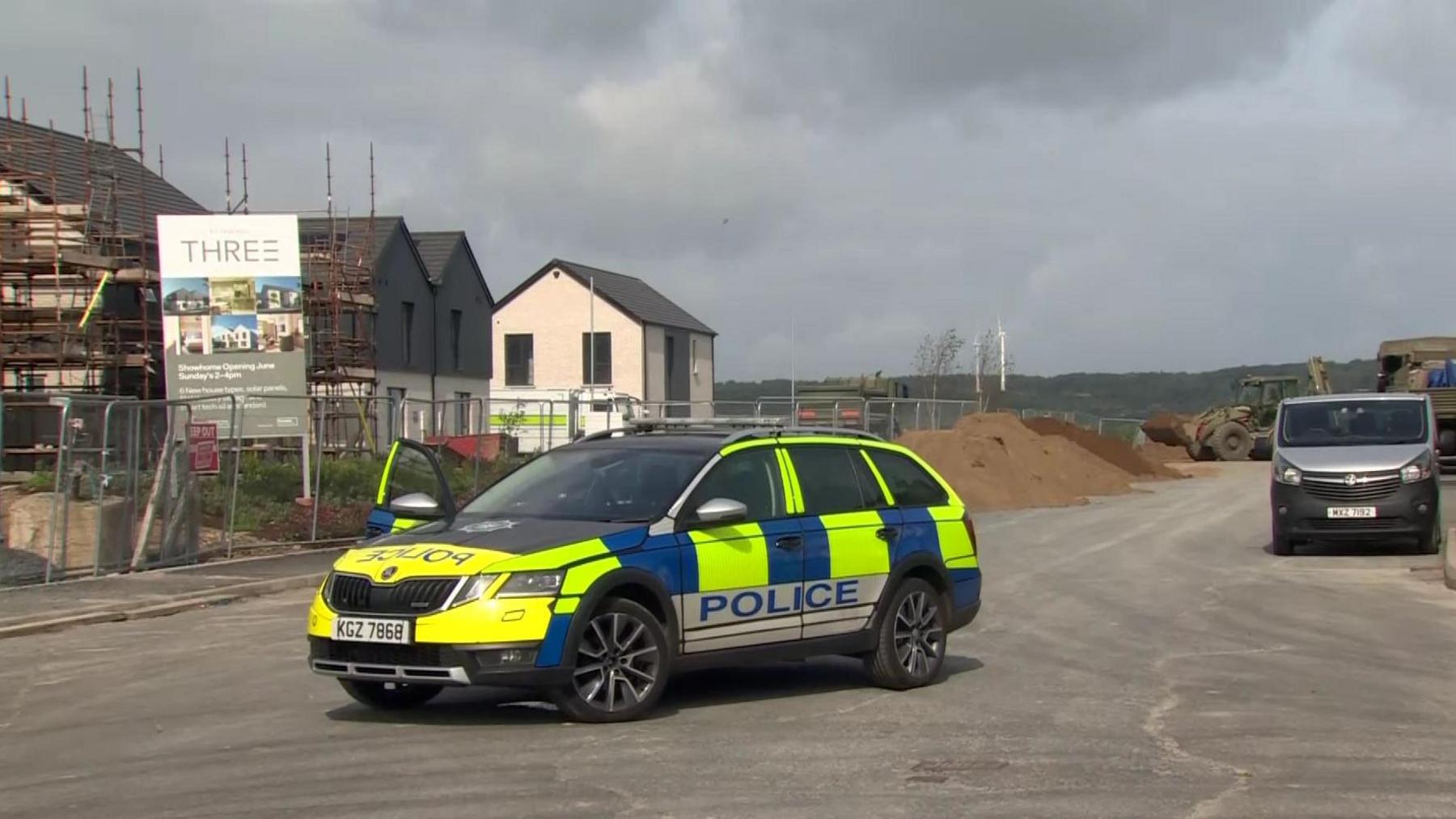
Soldiers are using diggers to pile sand on top of the device ahead of a decision about disposal
Supt McDowell said that if residents have not yet been spoken to by police, it is "unlikely" they will be affected by the operation.
He said the operation has moved into the mitigation phase, with work under way to establish protection to nearby properties to allow the device to be examined.
A decision will then be taken by the PSNI and the military to either deal with the munition at the scene or to remove it.
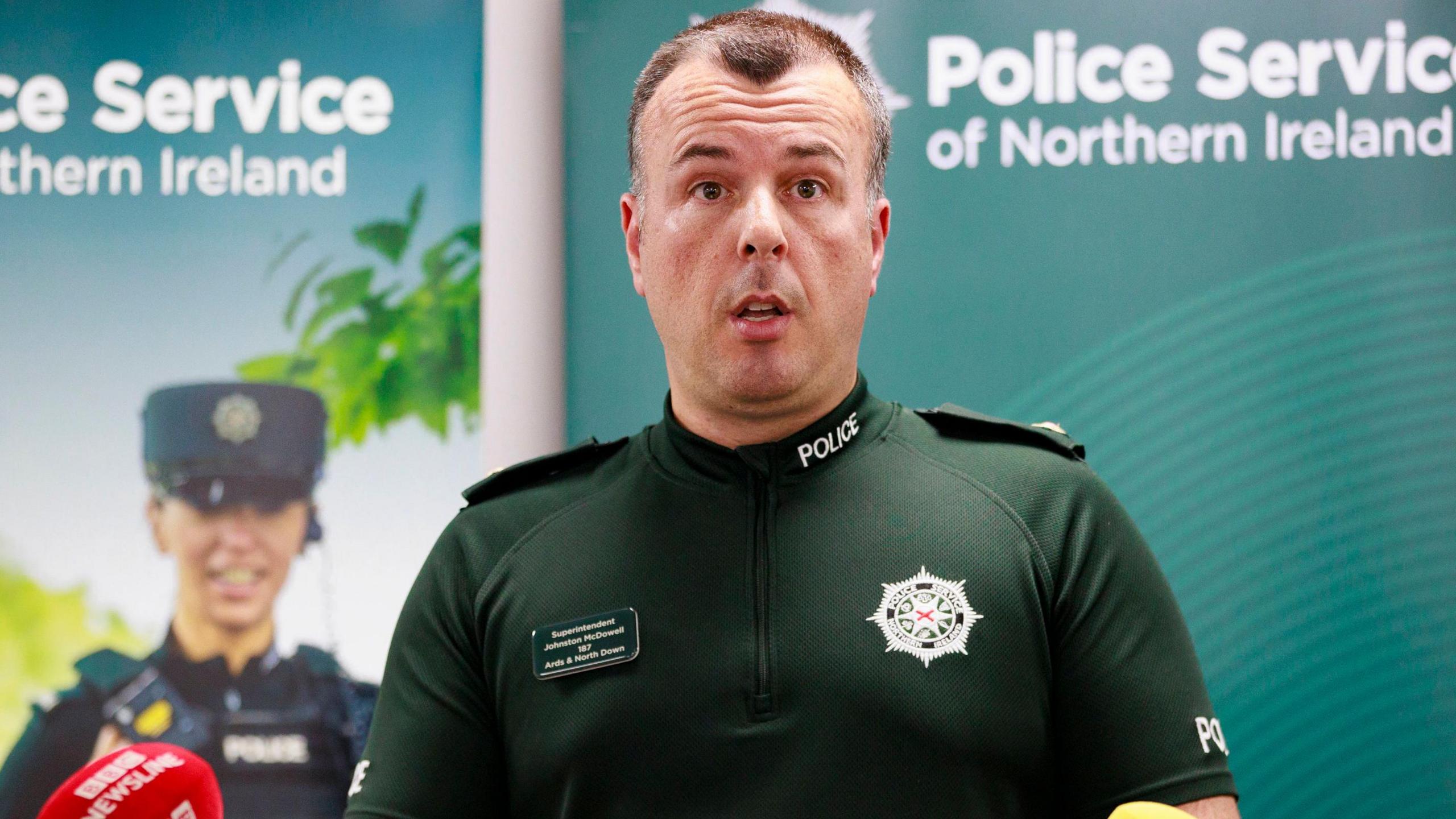
PSNI Ards and North Down district commander superintendent Johnston McDowell
Supt McDowell said there is "no definite timescale" for this but such operations commonly take five days.
"Keeping people safe is paramount and we will not take any risks," he said.
"It’s unlikely there are any other munitions in the area, however there are steps that developers can take to bring companies in to have an assessment of the area to ensure it’s free from any other munitions."
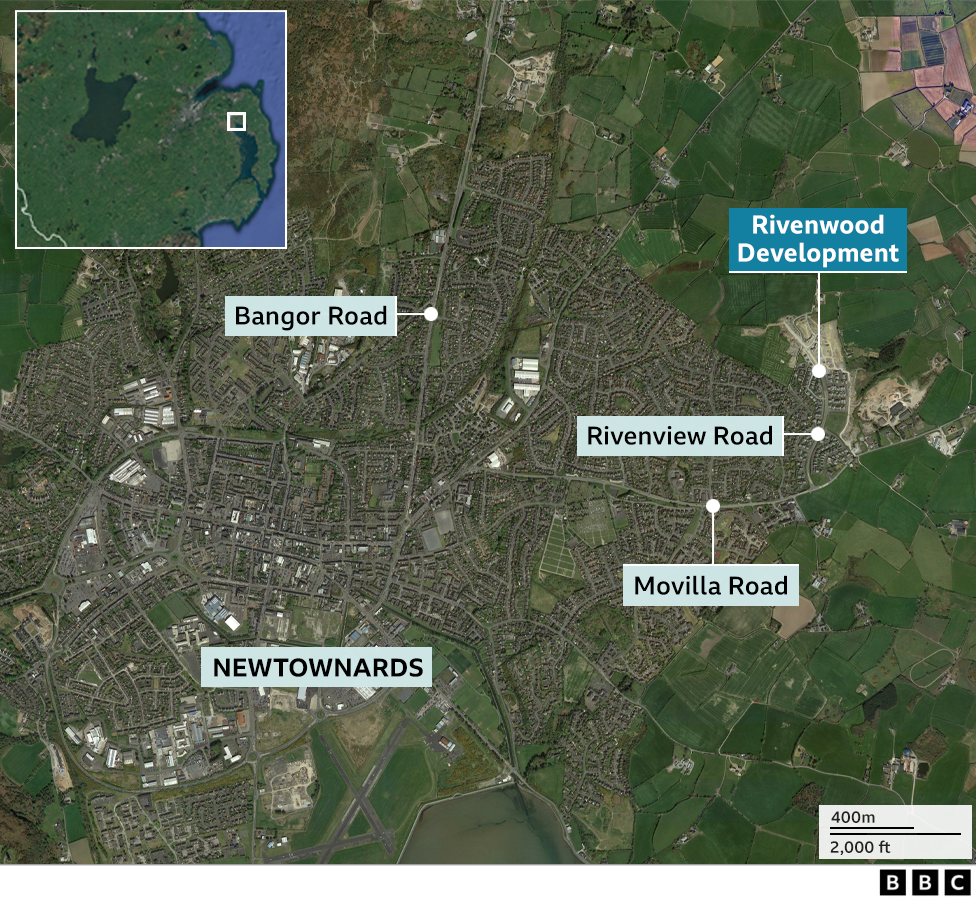
The police have not yet confirmed what type of explosive has been found but Belfast and its surroundings were heavily bombed by Germany in 1941.
World War Two munitions are found across Northern Ireland from time to time, but they rarely cause this level of disruption to people living nearby.
Military historian Jonny McNee told BBC News NI the bomb ''has probably come from one of the raids that the Germans carried out on the Newtownards airfield on the 15 and 16th April 1941.''
He said the Luftwaffe used two bombs - ''250kg and 500kg ones'' - and a 500kg bomb is thought to be the one found in Rivenwood.
''They were very dangerous then, and they are extremely dangerous now, as the intervening years have made them much more unstable, particularly the fuses and the explosives in them.'
''The bomb has been lying in the ground for 80 odd years, decomposing, rotting away, the fuses become unstable, and it doesn’t take much to bring those electric clockwork fuses back into life.
''What was dropped by the Luftwaffe in this raid is one of the standard high explosive general-purpose bombs that could have taken out several houses.''
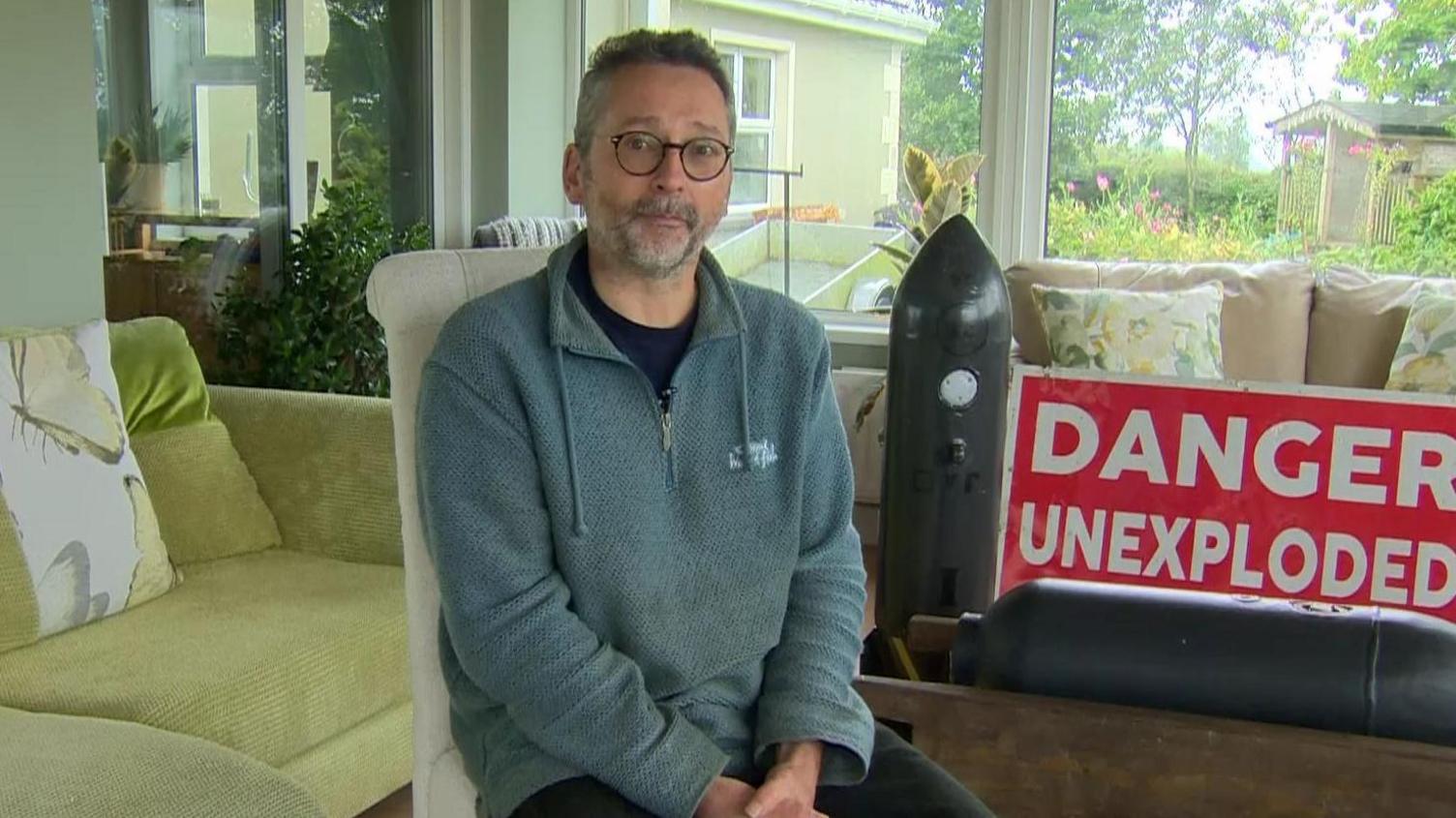
Historian Jonny McNee - pictured with replicas - says the Newtownards bomb was probably dropped in April 1941
James Fraser from the developer Fraser Partners said a groundwork contractor was digging a service trench about 1.5m deep when he noticed "something that didn't look right."
He said the contractor spoke to a supervisor who was able to identify the device as a wartime bomb and contacted the PSNI.
Mr Fraser also asked about home insurance claims.
"A lot of policies will have this as an exclusion under active war. If it was under current warfare it wouldn’t be included, but given the date we are pretty confident we will be covered."
Stephanie O'Fee, who lives very close to the site, said it was "a huge concern".
"What are we going to go back to? Will there be much of the house standing?" Ms O'Fee said.
Speaking to the BBC's Good Morning Ulster programme, Ms O'Fee said the situation was "very, very nerve-wracking".
"My house is very close, so obviously there are concerns – what damage is going to be done to our homes?" she said.
She has lived at Rivenwood for two years and said it was her first home.
She said she noticed police cars in the development on Friday but only found out about the evacuation plan when an officer knocked on her door at about 20:00 BST on Saturday.
She and her neighbours were told that all homes and businesses with a 400m radius should be evacuated by 10:00 on Sunday.
A leaflet from police distributed to residents said that a "sizeable item of historic explosive ordnance" had been found in the estate.
The Blair Mayne leisure centre in Ards has been set up as an emergency support centre for affected residents.
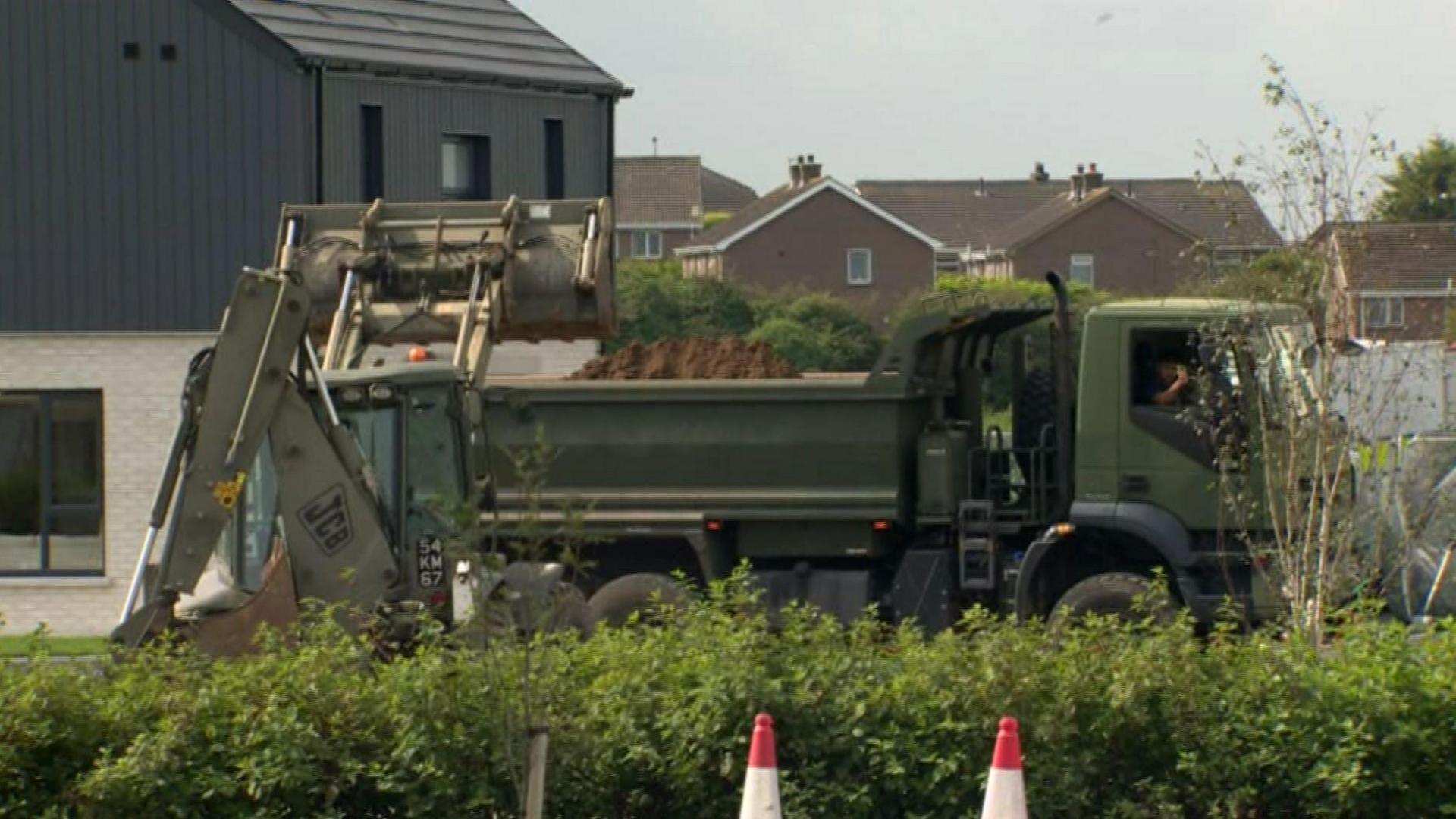
Democratic Unionist Party MP Jim Shannon told BBC News NI if the bomb went off it would be "devastating".
"The Army bomb disposal unit will be very proactive and very positive, their job is to make it safe and thereby let people back into their homes as soon as possible," he said.
After speaking with residents, Ulster Unionist Party MLA Mike Nesbitt, said ''one of the biggest issues is pets".
"There’s a lot of people who are still in Rivenwood trying to decide whether they’ll breach the police cordon, because they’re concerned about their pets in the short term," he said.
From the scene: A time of upset and upheaval
By BBC News NI reporter Kevin Sharkey
Families are continuing to make emergency arrangements after having to leave their homes.
It is clearly a time of upset and upheaval with many residents wondering when they will be allowed to return to their homes.
Different families are dealing with many different and sometimes difficult situations including caring for elderly relatives and children with special needs.
Inside the very wide cordon, major preparations are continuing ahead of the bomb being dismantled later this week.